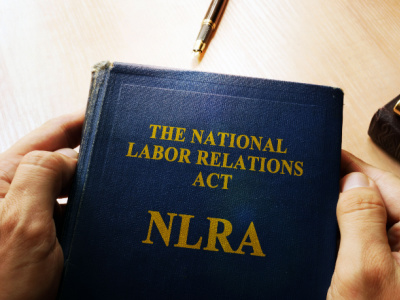A recent National Labor Relations Board (NLRB) ruling determined that including certain nondisparagement and confidentiality provisions in severance agreements violates the National Labor Relations Act (NLRA).
Facts
McLaren Macomb Hospital permanently furloughed 11 employees and contemporaneously presented them each with a “Severance Agreement, Waiver and Release.” The agreement contained provisions that broadly prohibited them from making oral or written statements disparaging the hospital and from disclosing the terms of their severance agreement.
The NLRB held the non-disparagement and confidentiality provisions unlawfully restrained the employees from exercising their right to engage in protected activity. Specifically, the Board stated the restrained protected activity could include the employees’ ability to make public and private statements about their terms and conditions of employment, assist coworkers with workplace issues, and engage with the NLRB to bring an unfair labor practice (ULP) charge or assist in an investigation.
The Board expressly confirmed that the NLRA’s protections extend to former employees and stressed that severance agreements must be narrowly tailored to protect against infringement of any rights protected by the Act. McLaren Macomb (Case 07-CA-263041).
Lessons to Learn
Here are some key takeaways from this case:
- McLaren’s restrictions apply to both union and non-union employees.
- Language could be added to a severance agreement excepting NLRA protected activity from the agreement’s confidentiality provisions.
- Employers concerned about disparagement should revisit their form separation agreements and tailor them to address the specific concerns involved. If, for example, an employee has sensitive confidential information, the confidentiality concern should be specifically defined and addressed rather than relying on a blanket disclosure restriction.
- Severance agreements should be framed using terms excluded from the NLRA’s protection rather than “disparagement.” Employees’ right to engage in protected activity doesn’t extend to communications that are defamatory, reckless, or maliciously untrue.
- Enforcement of preexisting confidentiality and non-disparagement clauses the NLRB considers “overbroad” may risk ULP charges and could result in an award of monetary damages. Although the NLRA doesn’t provide for monetary penalties, the NLRB’s General Counsel currently has policy of seeking monetary relief that is directly attributable to a ULP, including attorney’s fees and costs. This means attempts to enforce overbroad confidentiality and/or non-disparagement clauses could result in ULP charges in which the NLRB seeks to reimburse the employee for attorneys’ fees expended defending against the employer’s enforcement proceeding.
Overall, McLaren limits the effectiveness of current boilerplate language in many separation agreements, but it doesn’t prevent you from tailoring provisions to effectively address specific concerns that may cause actual harm.
Aaron D. Graves and Alexander J. Burridge are attorneys with Bodman PLC in Detroit. You can reach them at agraves@bodmanlaw.com and aburridge@bodmanlaw.com.

